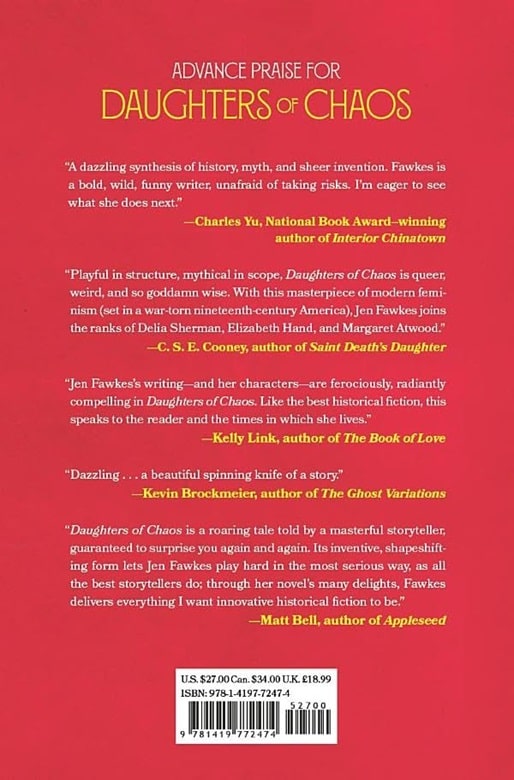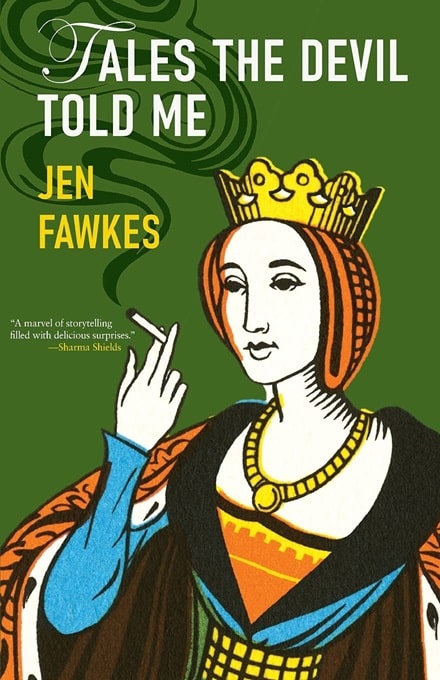A First Rate First Novel: Daughters of Chaos by Jen Fawkes
 |
 |
Daughters of Chaos (Harry N. Abrams, July 9, 2024)
Back in 2021 I ran across a story collection by a writer I had never heard of – Tales the Devil Told Me, by Jen Fawkes. I wrote of it,
It comprises a set of reimaginations of fairy tales and other classic literature: there are radical takes on Rumpelstiltskin, the Odyssey, Moby Dick, Peter Pan, and more. In most cases they take a sympathetic view of the villain of the tale; and they are by turns witty and dark, extravagant and savage.
Fawkes has published one other collection, Mannequin and Wife. Now we have her first novel, Daughters of Chaos.
This is told by Sylvie Swift, who writes this for her twin daughters in 1877, 14 years after the events the novel depicts (and after their conception.) Sylvie and her own twin, Silas, were born as their mother died, and were raised in Kentucky until they were 14 by their devastated father and their ten years older sister, Marina. As they grow, it’s clear to Sylvie that Silas has an excessive fascination with fire – and he claims to see people in the fire.
 |
 |
Tales the Devil Told Me (Press 53, October 5, 2021), and author Jen Fawkes
When Marina leaves them, their father tries to hold on as long as he can, but after a suspicious fire he dies. The Civil War has started, and Silas runs off to join the Confederate Army. Sylvie, now 18, and, like their father, an abolitionist, heads instead to Nashville, in hopes of finding Marina, and carrying only the mysterious manuscript the two received from their sister: the Apocrypha, a lost play by Aristophanes.
Once in Nashville, Sylvie lands in a whorehouse, The Land of the Sirens. She was led there because Marina had sent the play from there. And Sylvie is taken in, though not to be a whore. She has some facility with languages, and the proprietor, one Evangeline Price, wants her to translate the Apocrypha into English. After a while she encounters another group of women, the Southern Ladies’ Aid Society, and in particular an enchanting redhead named Hannah Holcombe. She also meets the Union Colonel in charge of the occupying force in Nashville, one William Truesdail, who wishes her to infiltrate – the Southern Ladies’ Aid Society, whom he suspects (with good reason) of interfering with the Union’s efforts in Nashville.
And so the story continues, as Sylvie is drawn into the orbit of the two quite feminist groups in Nashville – the whores at Land of the Sirens, and the Southern Ladies’ Aid Society. She learns about the Cult of Chaos, an ancient group of women aiming to set up Chaos against Order (supposedly represented by men) and in so doing put an end to war and other male oppression. It turns out that the play Apocrypha is in its way about this effort as well. Meanwhile, Silas is working for the Confederate Navy, helping with the effort to make submersible vehicles.
The Land of the Sirens is putting on a play. Sylvie learns about a women called Gaia Valentino, a 16th Century Venetian woman who is clearly another Chaos advocate. The prostitutes of Nashville are under threat from the city’s leaders, who believe they are spreading syphilis. The Southern Ladies’ Aid Society is planning more raids. Sylvie is attracted to William Truesdail, but especially to Hannah Holcombe. And Sylvie encounters first Marina’s son, and then a much-changed Marina herself…
I won’t detail the rest of the plot. A lot goes on really – but this is wartime. Some of it – including, to my surprise, the failed attempt to exile Nashville’s prostitutes, followed by legalization of prostitution in exchange for license fees and health examinations – is actually historical fact. Some of it, I confess, I had a hard time buying – such as the Cult of Chaos opposing war by pretty violent methods, and their bothsidesist attitude towards the Union and the Confederacy.
But it’s all fascinating and involving. I did feel that Silas’ role, though not unrealistic in context, was a bit underwhelming – and likewise the ending, though again logical, fell just slightly flat. All in all, this is an exciting and challenging novel, a mix of real historical fiction with some pretty wild and intriguing fantastical elements – and a first rate first novel.
Rich Horton’s last article for us was a review of Galactic Gambit by Roy C. Dudley. His website is Strange at Ecbatan. Rich has written over 200 articles for Black Gate, see them all here.